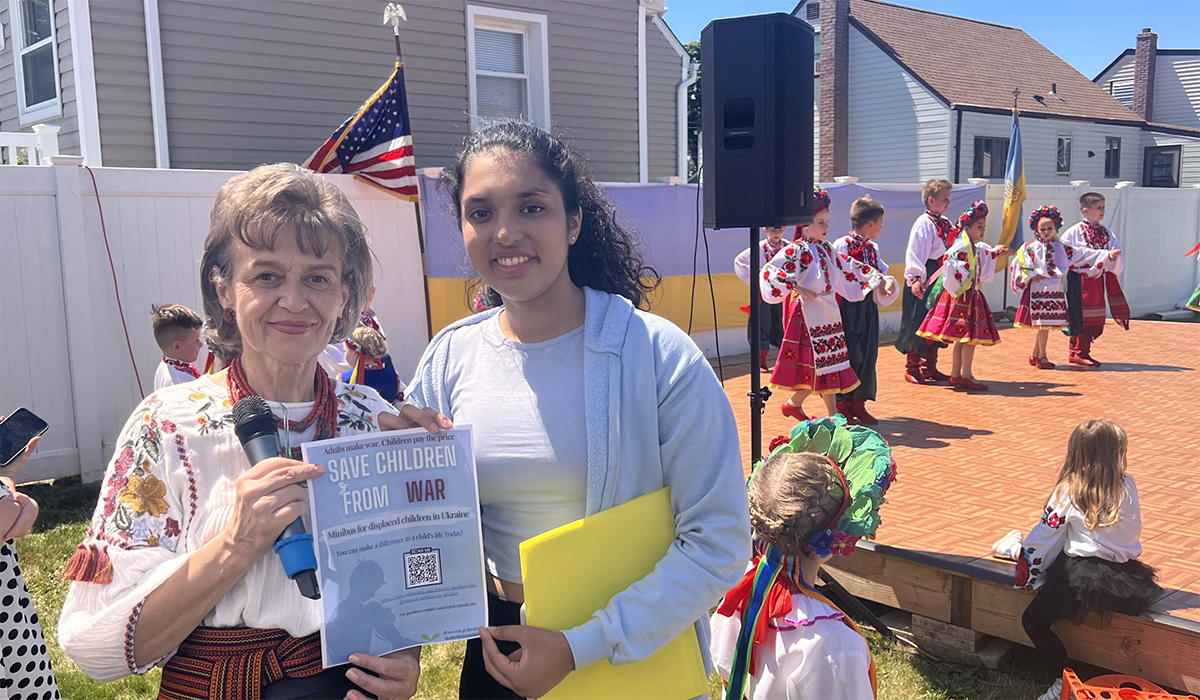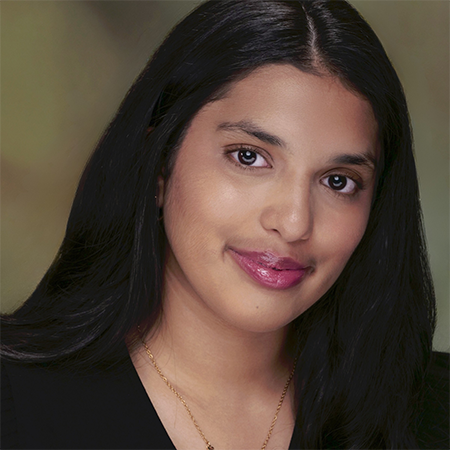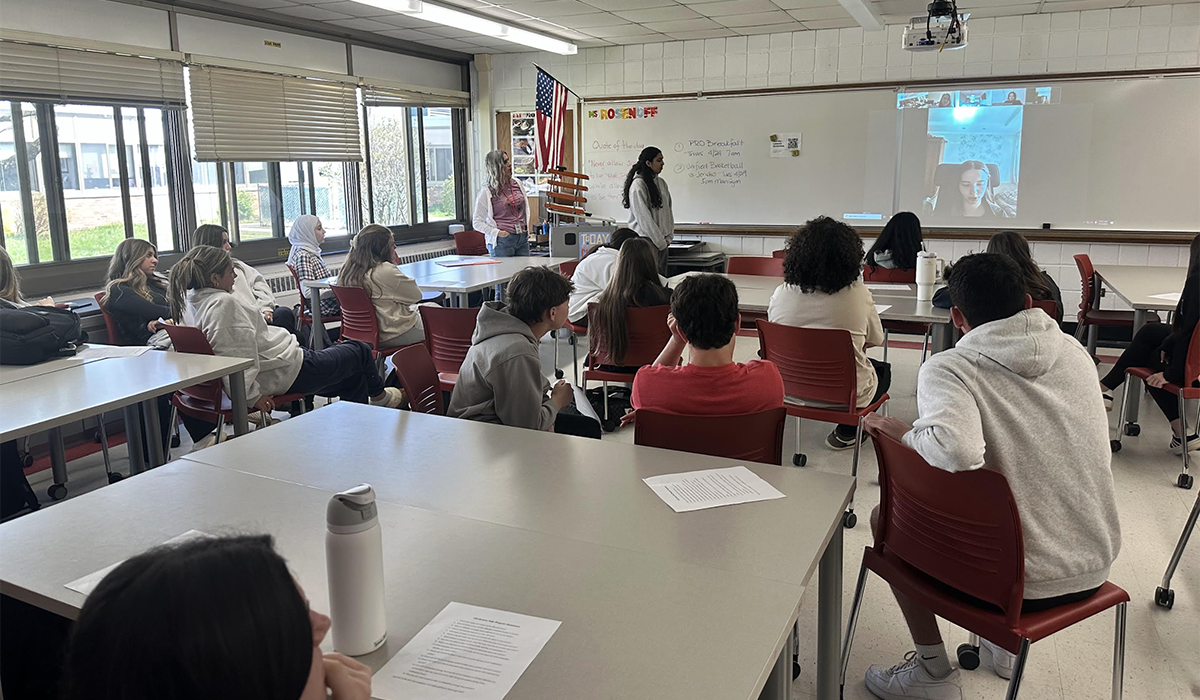From Sweet Sixteen to Saving Children from War

Meet Daily Point of Light Award honoree Saanvi Peri. Read her story, and nominate an outstanding volunteer or family as a Daily Point of Light.
For Saanvi Peri, a young leader and visionary, what started as a personal effort to help others has blossomed into a full-fledged international youth-led nonprofit. Saanvi was inspired to act after watching the conflict unfold in Ukraine. She used her sweet sixteen money to help and then led a campaign that raised around $20,000. These funds helped purchase two minibuses, which are currently transporting over 13,000 displaced people, including women and children. This effort alone has had a profound impact.
To help others understand the human cost of the conflict, Saanvi amplified the voices of Ukrainian teens, interviewing them and sharing their stories in local newspapers and podcasts from The Telegraph that reached more than 30,000 people. She also started a U.S.-Ukraine peer program which brings local students and Ukrainian students together to foster understanding and support. She is currently working on new exchanges with schools in Syria and Vietnam. Saanvi even created a toolkit to empower other young people to begin their own humanitarian initiatives.
Saanvi’s work has directly impacted thousands of youth and inspired global youth action. The minibuses she helped fund have been a lifeline, transporting displaced single mothers and wounded servicemen, including 46 people with disabilities. According to United Forces for Aid to Ukraine, the bus will also help 2,451 children from surrounding villages attend school. Her nonprofit, Save Children from War (SCFW), now has over 10 active chapters in the U.S. Europe and Asia. Her innovative and compassionate leadership earned her the Congressional Award Gold Medal.
Saanvi’s vision continues to grow. She is currently drafting a global declaration to be signed by youth around the world, advocating for the integration of youth-led support systems into humanitarian response and education plans for youth affected by conflict. She is also developing an app called Aluma to provide support systems for young people. This is based on the idea that youth understand each other best. Saanvi also serves as a chief technology officer for the Indian nonprofit Lakshitha, where she is helping to expand educational opportunities for underserved children by developing digital platforms and a mentorship portal. Her dedication to serving others, whether close to home or on the other side of the world, is an example for us all.

Tell us about your volunteer role.
I am the founder of Save Children From War, a nonprofit dedicated to protecting and empowering youth affected by war. My role includes leading fundraising initiatives, designing programs that provide relief and support, and building partnerships with local and international organizations to maximize reach and impact.
I work closely with a network of ambassadors who mobilize volunteers in their own communities to raise funds and collect aid, as well as a team of dedicated mentors who provide guidance and support to help us grow sustainably. Our most notable initiatives have resulted in procuring minibuses that are now transporting families and wounded soldiers to safety and bringing children to school and providing critical resources and financial support to orphanages caring for vulnerable children.
Why is this issue so important to you?
Children should never have to bear the consequences of conflicts they did not create. War strips away not only their safety, but also their education, their sense of security and sometimes their dreams for the future. My perspective on this became personal when I interviewed Ukrainian teens for an article I was writing. Speaking with kids my own age about our similar interests but also hearing about how the war affected their life, not because of anything they had done, but because of where they were, made me want to take action. I feel a responsibility to stand with them and amplify their needs, because too often, youth are an afterthought in conversations about war and recovery. Supporting them is about ensuring they grow up with hope, dignity and opportunities to thrive despite the hardships they’ve endured. To me, protecting children in war zones is both a moral responsibility and a way to invest in a more peaceful, compassionate future.
What inspired you to get started with this initiative?
My inspiration came from listening to the stories of children during war on a podcast. I was struck by their resilience and courage, but also by the profound losses they had endured: losing their homes, schools and in some cases, family members. I realized that while I could not stop the war, I could take tangible steps to help these children feel safer and more supported. What started as a small effort to raise money for minibuses to transport displaced children quickly grew as I connected with journalists, community leaders and organizations that believed in the cause. Their support showed me that one idea, even from a teenager like me, could grow into something much larger. That was the spark that became my nonprofit, Save Children From War.
What are your long-term plans or goals for the organization?
Thinking long-term, I hope to expand Save Children From War’s reach to youth in other conflict-affected regions that could benefit from our services. My vision is to create a global network that combines emergency relief with long-term empowerment initiatives like scholarships, mentorship and community programs. I also want to focus on giving youth platforms to share their own voices and stories so they can advocate for themselves and shape their own narratives. Ultimately, my goal is to build sustainable programs that not only address immediate needs but also break cycles of trauma and poverty and help more youth rebuild their lives and reclaim their futures.
What’s been the most rewarding part of your work?
The most rewarding part has been witnessing the direct impact of our work. I will never forget seeing the children’s faces light up as they boarded the minibuses we helped provide. Those smiles remind me why this work matters. It has also been deeply rewarding to connect with youth across cultures through our peer programs in three continents and watch empathy grow between communities that might never have crossed paths otherwise. Knowing that something I helped start can bring both practical relief and emotional hope is the greatest reward of all.

What have you learned through your experiences volunteering?
Through my experiences, I’ve learned that real change begins when you step outside your comfort zone and act, even if you don’t feel fully prepared. I’ve learned that leadership is less about giving directions and more about listening, especially to those who are directly affected.
I’ve also seen how powerful community can be. Whether it’s people donating, volunteering or simply spreading the word, collective action is what turns small ideas into movements. Finally, I’ve learned that resilience is not something you read about in books; it’s something you see in the faces of children who, despite everything, still dream and smile. That lesson has shaped me not just as a volunteer, but as a person.
Why is it important for others to get involved with causes they care about?
When people get involved directly with a cause, they become part of a bigger story of change. No one person can solve every problem, but every person can make a difference in their own way. Getting involved allows individuals to transform their compassion into action, and it often creates ripple effects; one act of kindness can inspire others to do the same. It’s also important on a personal level as volunteering also gives people a sense of purpose, perspective and connection. By working for something larger than ourselves, we not only help others but also grow in empathy and understanding.
Any advice for people who want to start volunteering?
My advice would be to start small and start now. You don’t need to have a perfect plan or a huge network to begin making a difference. Sometimes it’s as simple as offering an hour of your time, using a skill you already have or supporting an existing organization. Don’t be afraid to reach out and ask how you can help; most nonprofits are eager for extra hands and fresh ideas.
If you feel strongly about an issue, follow that passion, because your energy will be contagious. And remember, you don’t need to change the whole world at once. Focus on one step, one project or one person at a time, and you’ll be amazed at the impact you can create.
Do you want to make a difference in your community like Saanvi? Find local volunteer opportunities.